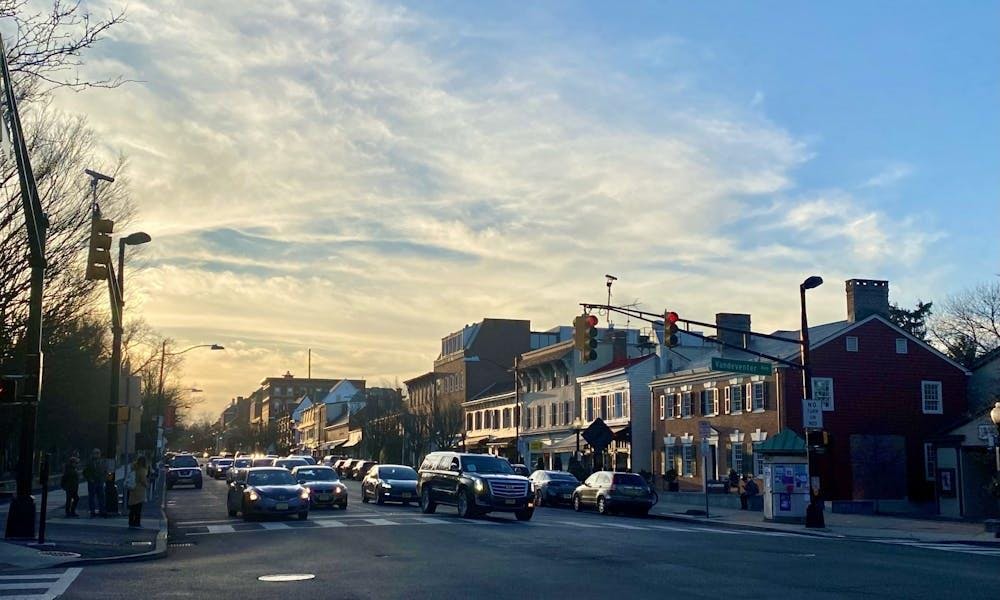While many are sleeping in on a Saturday morning, Riya Joshi ’27 is up at 6 a.m., responding to emergency calls.
Joshi volunteers with Princeton First Aid and Rescue Squad, an organization that provides emergency medical support and technical rescue services to Princeton and its surrounding neighborhoods. As a volunteer, she helps to provide emergency medication and transport injured patients to the hospital.
“It’s been a great experience because I’ve gotten the chance to practice what I’ve learned in class in real-world 911 situations,” Joshi said. “It’s been fulfilling to help people in times of need.”
On campus, a disconnect currently exists with the town. According to the 2024 “Prince Senior Survey,” only 35 percent of Princeton students took part in community service during their time on campus. Princeton Mayor Mark Freda has expressed concerns about Princeton students’ lack of engagement with the community off-campus, and President Eisgruber has spoken about the importance of Princeton partnerships with community projects in town.
The Daily Princetonian spoke with student volunteers, and those who work in the town, to learn more about their outlook on community engagement.
For Nadia Makuc ’26 and Arthur Acuna ’23, who volunteer for the student project Loaves and Fishes, a restaurant-style soup kitchen founded by the Diocese of Trenton almost forty years ago, their personal faith and volunteering are interconnected. Acuna currently works for Princeton’s Aquinas Institute.
“My whole worldview comes from a hope in a just society that God wants for us,” Makuc said. “Serving the poor and loving others is definitely what inspires me [to serve] at all.”
Though Loaves and Fishes originally formed to combat food insecurity around Thanksgiving, it now operates the last two Saturdays of every month, with the help of many Princeton students.
“Because Loaves and Fishes is restaurant-style, you actually get to meet people and develop a relationship with them,” Acuna stated. “When we go out to serve in a local community like Trenton, that’s a chance to be face to face with God in our neighbor.”
A common theme for students expressed across all interviews was the value of off-campus work as a contrast to Princeton’s insular Orange Bubble, as well as an opportunity to escape academic work.
“When you’re only studying all the time, that can get very boring, so it’s fun [to volunteer],” Kelly Kim ’26, founder and president of Food Bank Express, wrote to the ‘Prince.’ “I like volunteering because it feels like I can, and it’s within my reach.”
Food Bank Express also works to address food insecurities within the community. Kim emphasized the merit of food banks in a written statement to the ‘Prince.’

“I think food banks are one of the purest ways you can help people,” said Kim. “I’m from Chicago, so we see a lot of food insecurity, and helping at food banks [in high school] was something very engaging in my life.”
Off-campus work also provides volunteers with unique opportunities to see people and real-world impacts not often viewed on Princeton’s campus.
Kim, for instance, noted a clear economic divide upon departure from Princeton. “Across the street from the Mount Carmel Guild that we volunteer at, there is a completely disheveled building, with glass windows broken into,” she said. “Getting out of Princeton with other people and seeing what’s really happening in the world — that’s what makes volunteering meaningful. Your work is just more new.”
Caring for Kids, a student-run volunteer project in which volunteers babysit teenage mothers’ children on Fridays, similarly bridges students and town residents.
Makuc, a project leader for Caring for Kids, said in a statement to the ‘Prince’ that she has “never wished she could have been translating Latin or sleeping in because it’s worth it to go. Caring for kids on Friday nights is one of those things where babysitting can allow teen moms to get, like, one evening to just be teenagers.”
Other students are paid for their work in the broader Princeton community work. Aaron Faier ’26, for instance, is a student-teacher at the Jewish Center of Princeton down on Nassau Street. At the Jewish Center of Princeton, according to Faier, children learn about Jewish tradition and are encouraged to ask questions about their faith. Common teaching topics include the Sabbath and prophets.
For Faier, faith and ability to make an impact led to his decision to become a teacher. “I find teaching to be very meaningful, and I have a good feeling after,” said Faier. “Trying to impart wisdom, trying to make change in their lives in a positive way, and introducing [the kids] to Judaism … I find it valuable for myself.”
Acuna, reflected on his undergraduate volunteer experience as being an integral part of his time on campus.
“The homework will always be there. The people won’t always be and so I think it's just a beautiful opportunity to be taken out of Princeton and realize there’s a whole other world out there.”
Mary Balid is a News contributor for the ‘Prince.’
Shaun Karani is a News contributor for the ‘Prince.’
Please send any corrections to corrections@dailyprincetonian.com.








